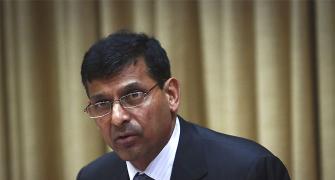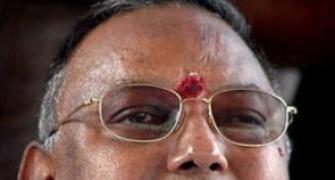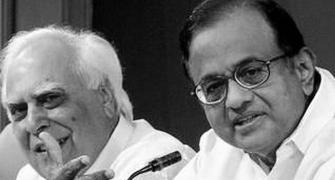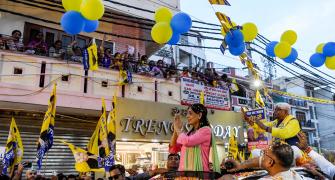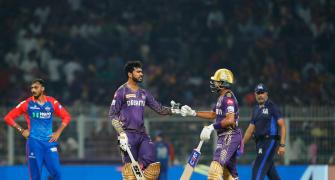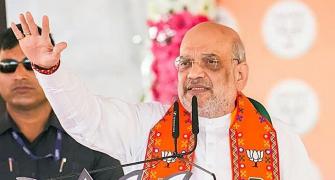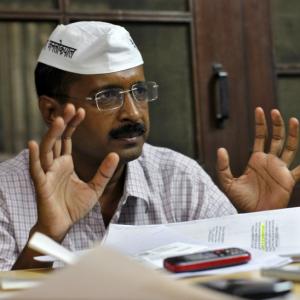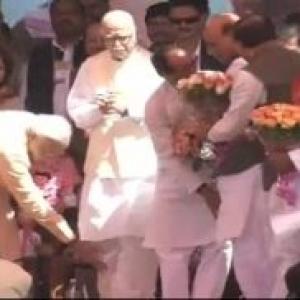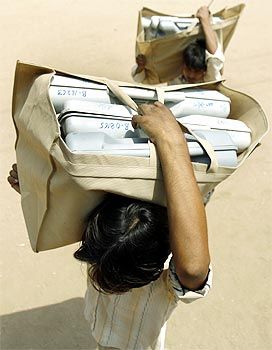 The year-end assembly elections in Madhya Pradesh, Chhattisgarh, Delhi, Rajasthan and Mizoram, the dates for which were announced by the Election Commission on Friday, have acquired a special significance as the results of these polls are expected to set the tone for the 2014 Lok Sabha elections.
The year-end assembly elections in Madhya Pradesh, Chhattisgarh, Delhi, Rajasthan and Mizoram, the dates for which were announced by the Election Commission on Friday, have acquired a special significance as the results of these polls are expected to set the tone for the 2014 Lok Sabha elections.
The assembly polls are a test for both the Congress and the Bharatiya Janata Party as the two are facing-off in Madhya Pradesh, Chhattisgarh, Rajasthan and Delhi although the presence of the newly-floated Aam Aadmi Party has added a new dimension to the election in the national capital.
The polls pose a challenge for the BJP as the verdict will be widely perceived as a referendum on the popularity of its prime ministerial candidate Narendra Modi who has already launched an extensive election campaign.
The election will also determine the political future of Madhya Pradesh Chief Minister Shivraj Singh Chouhan and Chhattisgarh Chief Minister Raman Singh who have already been in power for a decade.
The elections could prove to be a do-or-die battle for the Congress which is reeling under the weight of corruption charges while spiralling inflation and a perceived governance deficit have added to its woes.
Three-term Delhi Chief Minister Sheila Dikshit and Rajasthan Chief Minister Ashok Gehlot are fighting hard to retain power in their respective states despite the anti-incumbency factor. The presence of the AAP has added a touch of uncertainty in Delhi as there is still no clarity about the impact it will make in the coming polls.
Most importantly, these elections will determine if Congress vice-president Rahul Gandhi has the necessary credentials to lead the party as he has been billed as its chief poll campaigner.
The Congress party’s chief concern is to see that the coming elections focus on local issues and not on the performance of the United Progressive Alliance government in Delhi.
The BJP, on the other hand, will make every possible effort to further tarnish the image of the Manmohan Singh government by concentrating on its poor governance record as well as the ailing economy and other corruption charges which have surfaced against it. The BJP would like to make these elections “Modi-centric” as a build up to the 2014 general election.
The assembly polls in Delhi are being keenly-watched for several reasons. Being the national capital, it becomes a matter of prestige for the two major contenders to emerge victorious.
In power for the past 15 years, the Congress’ Sheila Dikshit is facing a tough contest even though the BJP unit in Delhi is ridden with factionalism and has no charismatic chief ministerial contender who can take on the three-time chief minister even though her Teflon image has taken a severe beating.
The BJP is, therefore, banking heavily on Modi’s appeal with the middle classes and the youth to swing the election in its favour. However, the presence of the Arvind Kejriwal-led AAP has made it difficult to predict this election as it is not clear whether the party will damage the Congress of the BJP.
In neighbouring Rajasthan, BJP’s last chief minister Vasundhra Raje has been in election-mode for several months now as she seeks to unseat Gehlot who had defeated her five years ago on the issue of corruption.
Although Gehlot has covered sufficient ground with his various welfare schemes, the internal dissensions in the Rajasthan Congress and the spate of recent sex scandals could prove to be his undoing.
The BJP’s two-time Madhya Pradesh Chief Minister Shivraj Singh Chouhan has defied anti-incumbency and remains popular with the electorate because of his humble nature and his easy accessibility.
However, the same cannot be said about his ministers and legislators who are in the thick of controversies and corruption charges. The BJP faces a tricky situation here: its tally could reduce if it gives tickets to its sitting legislators.
Alternatively, it could face rebellion if it axes them. The BJP is, however, drawing solace from the fact that its political rival, the Congress, is a house divided though some recent efforts have been made to project a united front.
The Congress, on the other hand, is hoping to improve its position after it named Jyotiraditya Scindia as its poll campaign chief, also seen as his indirect projection as the party’s chief ministerial candidate.
Like Chouhan, Chhattisgarh chief minister Raman Singh is making a determined effort to win a third term. While his pro-poor schemes have proved to be popular, the Naxal violence and corruption could work against him.
As in the case of Madhya Pradesh, the BJP chief minister may sail through because of the bitter infighting in the local Congress unit which also lost all its senior state leaders in a Maoist attack earlier this year.
In addition, the perennial rebel, former chief minister Ajit Jogi, has threatened to make things difficult for the Congress unless his demands are conceded. Jogi wants to be projected as the party’s chief ministerial candidate and wants tickets for his wife and son.

